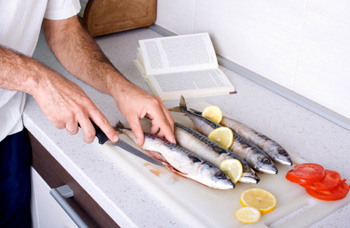 By now we all know that eating fish is good for you. Just as your grandma told you, it’s brain food! Well, it turns out that fish is also a great preventative food and a great food for your heart!
By now we all know that eating fish is good for you. Just as your grandma told you, it’s brain food! Well, it turns out that fish is also a great preventative food and a great food for your heart!
The American Heart Association recommends two servings of fish per week. Fish helps prevent heart disease, diabetes and certain cancers. Fish are an excellent source or protein and especially omega-3 fatty acids.
Why then do most of us only eat fish when we dine out? It’s reported that people eat fish out twice as much as they do at home. That’s a big number! For some reason, people are intimidated to cook fish at home, but they shouldn’t be? it’s fairly straightforward.
Plus, fish are not only healthy, but they are versatile too! Here are some foolproof methods to cook your fish at home. Your heart and brain will thank you!
- Poach – Poaching fish is a great method because it keeps the fish incredibly moist. Place the fish in pan and cover just barely with poaching liquid (you can use water, stock, milk, seasoned broth, etc as a cooking liquid), bring to boil, reduce to simmer with lid on, cook for a few minutes or until fish is fork tender. You’ll know when fish is done when it turns opaque and it flakes easily with the fork. And be careful not to overcook- no one likes dry fish!
- Broil/Bake – Two of the easiest ways to cook fish – virtually foolproof! Preheat broiler/oven, rub fish with herbs/seasonings of your choice, arrange in singer layer, place under the broiler and cook for 10 minutes per inch thickness, flipping halfway through. Again, be careful not to overcook.
- Sautéed – Season fish as desired, heat olive oil in skillet over medium-high heat, add fish in a single layer and be sure not to overcrowd your skillet. Cook fish 5 minutes per side, per inch of thickness or until done.
Just be careful what types of fish you eat and how much of it. Remember, it’s recommended to eat fish twice a week. Any more than that and you put yourself at risk for unhealthy levels of mercury or other environmental contaminants. Certain fish have more mercury than others- for example mackeral, tilefish, shark and swordfish.
Just like some fish have more mercury, some (for example salmon) have more omega-3s, which is excellent for you. And lastly, check with your local fish advisories to make sure no fish is endangered or on the warning list.
Related Posts
What are Omega-3s?- Kitchen Essentials
- And just where does our food come from?


 Are you ready to look better, feel more energized, and get back that youthful feeling you remember having as a kid? I can help you on a journey that will change the way you eat — for good. My
Are you ready to look better, feel more energized, and get back that youthful feeling you remember having as a kid? I can help you on a journey that will change the way you eat — for good. My 














 As a healthy cooking expert, health coach and TV host,
As a healthy cooking expert, health coach and TV host, 



Speak Your Mind